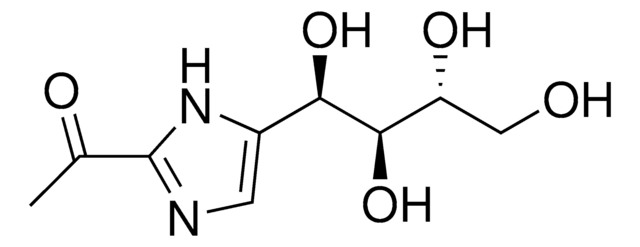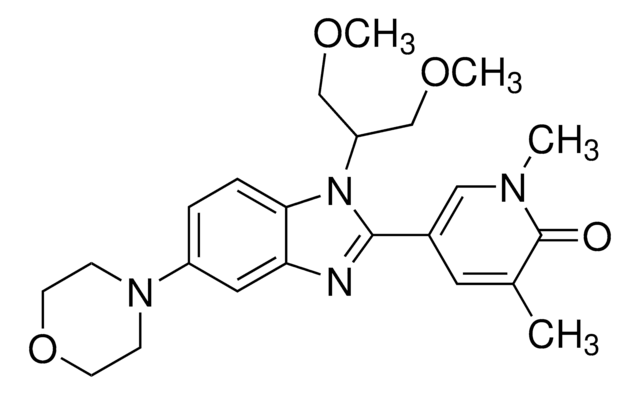T6330
THI
Synonyme(s) :
2-ATHBI, 2-Acetyl-4-tetrahydroxybutyl Imidazole; 1-[5-[(1R,2S,3R)-1,2,3,4-tetrahydroxybutyl]-1H-imidazol-2-yl]-ethanone
About This Item
Produits recommandés
Forme
powder
Niveau de qualité
Couleur
white to light brown
Solubilité
DMSO: 2 mg/mL, clear (warmed)
Température de stockage
2-8°C
Chaîne SMILES
CC(=O)c1nc(c[nH]1)[C@@H](O)[C@H](O)[C@H](O)CO
InChI
1S/C9H14N2O5/c1-4(13)9-10-2-5(11-9)7(15)8(16)6(14)3-12/h2,6-8,12,14-16H,3H2,1H3,(H,10,11)/t6-,7-,8-/m1/s1
Clé InChI
CQSIXFHVGKMLGQ-BWZBUEFSSA-N
Catégories apparentées
Actions biochimiques/physiologiques
Notes préparatoires
Code de la classe de stockage
11 - Combustible Solids
Classe de danger pour l'eau (WGK)
WGK 3
Point d'éclair (°F)
Not applicable
Point d'éclair (°C)
Not applicable
Certificats d'analyse (COA)
Recherchez un Certificats d'analyse (COA) en saisissant le numéro de lot du produit. Les numéros de lot figurent sur l'étiquette du produit après les mots "Lot" ou "Batch".
Déjà en possession de ce produit ?
Retrouvez la documentation relative aux produits que vous avez récemment achetés dans la Bibliothèque de documents.
Articles
Discover Bioactive Small Molecules for Lipid Signaling Research
Notre équipe de scientifiques dispose d'une expérience dans tous les secteurs de la recherche, notamment en sciences de la vie, science des matériaux, synthèse chimique, chromatographie, analyse et dans de nombreux autres domaines..
Contacter notre Service technique







